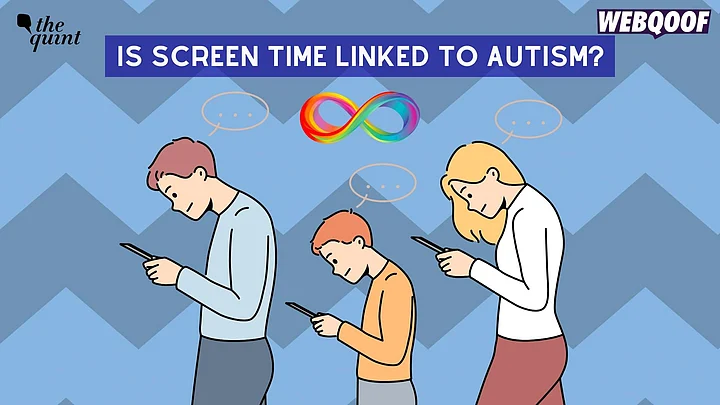Autism or Autism Spectrum Disorder (ASD), is a neurodevelopmental disorder that affects one's ability to communicate and interact socially, at the same time impacting their behaviour and sensory processing.
Autism is also a spectrum disorder, which means that individuals with autism can have a wide range of characteristics. Their individual abilities and needs can vary and evolve over time.
According to World Health Organisation (WHO), one in 100 children have autism. Every year 2 April is celebrated as World Autism Awareness Day and this year, however, there are various misconceptions about the condition and the cause of the same. This year, we reached out to experts to know more the alleged link between autism and screen time.
We spoke to Dr Neelu Desai, Consultant and Pediatric Neurologist and Epileptologist, PD Hinduja Hospital, Mumbai and Dr Fabian Almeida, Consultant Psychiatrist, Fortis Hospital, Kalyan.
Myth 1: Excessive Screen Time Causes Autism or Worsens Its Symptoms
There is no scientific evidence to support the claim that screen time directly causes autism, studies have explored that there can be a potential influence of screen time on various aspects of autism, including social skills, communication, and sensory processing.
According to Desai, "Although excessive screen use may pose developmental risks, the mixed findings, the small cohort sizes and the correlational nature of the available research requires further scientific investigation".
In one study published in 2022, it was found that longer screen time in boys at one year of age was significantly associated with autism spectrum disorder at three years of age.
Dr Fabian Almeida explains how the term 'virtual autism' is loosely used to emphasize the autism-like behaviour traits that could surface among children demonstrating high levels of mobile usage and screen time addiction.
He further adds that ASD arises from a complex interplay of genetic and environmental factors and while excessive screen time may influence behavior and development, it is not identified as a causative factor for autism.
Myth 2: It is great for autistic individuals to be exposed to more screen time because that will reduces human interaction and social anxiety
"This is not true as evidence shows clearly that reducing screen time improves social functioning and core symptoms in children with ASD," Desai said.
She also pointed out that with the rapid increase in device usage, it is necessary to review the health effects of screen time and to control and limit screen time.
Dr Almeida also explains that while screen time can provide opportunities for engagement and learning, it cannot replace the vital role of human interaction in the social and emotional development of individuals, particularly those with autism.
A research paper titled, 'Early electronic screen exposure and autistic-like symptoms' published in 2018 states that early and excessive exposure to screen can cause neurochemical and anatomical brain changes.
The study explains how neurotransmitter deficiency of dopamin, acetylcholine, gamma-aminobutyric acid (GABA), and 5-hydro tryptamine was observed in a group who were internet-addicted urban children and this may cause a spectrum of aberrant behaviour phenotype.
Myth 3: More screen time will not lead to sensory overload to individuals with autism
It is vital to note that each individual with autism is unique and their experiences and reactions to screen time may vary. Some individuals may find screen time engaging, while others may experience obstacles or negative effects.
According to Dr Desai, excessive, and continued screen time will worsen the already existing symptoms of autism and not result in any improvement.
"Individuals with autism often have sensory processing differences, and increased screen time can indeed contribute to sensory overload for some autistic individuals. The visual and auditory stimulation from screens can be overwhelming, leading to sensory chaos and potential meltdowns," says Dr Almeida.
Excessive screen time might limit opportunities for personal conversations that may hinder the development of social skills in autistic individuals. And so, the experts stress striking a balance between screen time and social engagement in real life.
Indian Academy of Pediatrics recommends that children below 2 years age should not be exposed to any type of screen, whereas exposure should be limited to a maximum of one hour of supervised screen time per day for children 24-59 months age, and less than two hours per day for children 5-10 years age.
